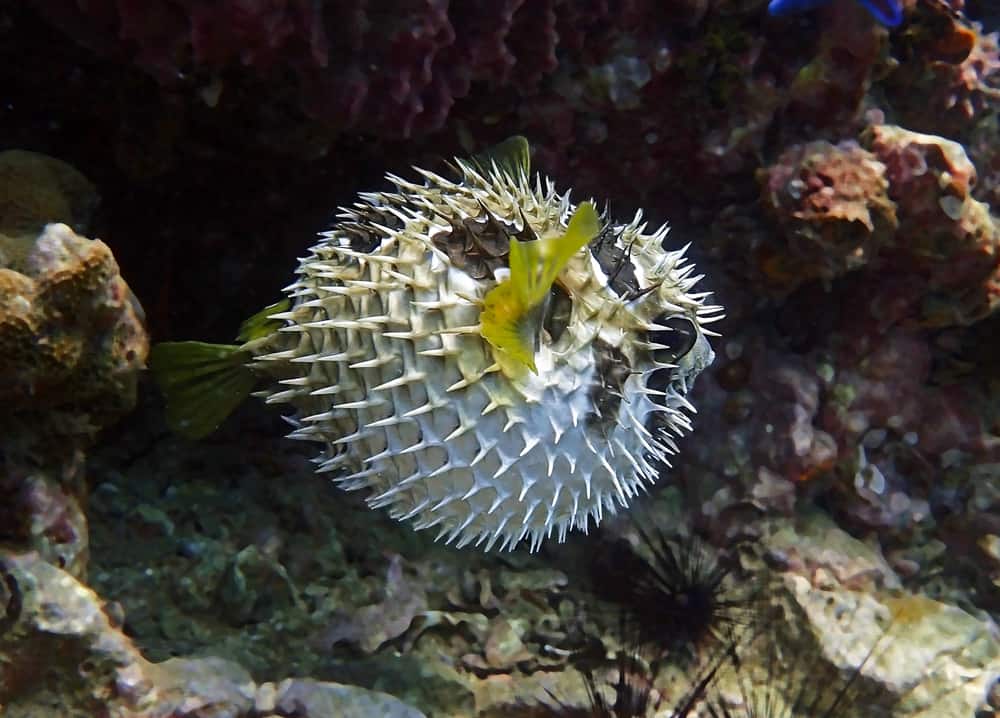
The longer I keep freshwater pufferfish, the more I fall in love with each species. There is such a diverse range of fish in the puffer family, even though it’s a relatively small group as a whole.
Here’s a brief list of a few things that I think set freshwater puffers apart from other aquarium fish:
- They all have a different personality. Even if someone says that something won’t work for a specific type of puffer – it never hurts to try it out, unless of course it’s going to harm your fish. For instance, most of what I’ve read about Congo puffers (T. miurus) says that they probably won’t eat snails and it will be really hard to transition them to dead prey; neither one of those held true for our little guy, even though they may apply to many other Congo puffers.
Just to illustrate my point, I threw a handful of ramshorn snails in our Congo’s tank thinking that he wouldn’t touch them. Well, he didn’t for months – long enough for their population to explode like crazy. However, one morning I woke up and saw him stalking the glass eating baby snails. It took him less than a week to completely destroy the entire colony of snails. What works for one puffer may not work for another, and that’s why they’re such fascinating fish to keep.
- Puffers are definitely not community fish. Despite the fact that some people swear by keeping their puffers in a general community tank, there’s still plenty of evidence and solid reasons not to. Like, I don’t know, the fact that all freshwater puffers, even with their cute face and expressive eyes, will always be predators – no matter how long you have kept them in captivity. Or, as I like to refer to them, the Ultimate Predator Fish. After all, what other fish is ridiculously smart (my opinion), has the ability to evade predators by puffing up, can take a serious chunk out of them if that doesn’t work, and if all else fails, gets in the last word by poisoning whatever ate them?
- I usually know more than the pet store – and I bet you do, too. Unfortunately, most pet stores are not knowledgeable about specialty fish, like freshwater puffers. They usually have a very broad knowledge on keeping fish as a whole, but no hands-on experience with the odd balls that they occasionally stock. However, that being said, it’s also not the pet store employee’s job to do the research for you! If you’re interested in purchasing a freshwater puffer, then you should always come prepared with your own research – and always, always fact check anything you’re told. Although, this could be said of any purchase you make, period.
- Topping off and water changes are two completely different things. Although frequent, large water changes are important regardless of the type of tank you’re keeping, anything that excretes as much waste as a puffer does demands a strict adherence to a regular maintenance schedule. And as easy as it is to just top off the tank when the water line gets low, don’t forget that toxins, like Ammonia and Nitrite, don’t evaporate. Instead, they’re left behind creating a increasingly concentrated toxic mess the longer you let that water evaporate.
Some Final Thoughts On Keeping Freshwater Puffers
Over the years, I’ve kept quite the variety of tropical fish. And you know what? Puffers are by far my favorite. Although other aquarium fish will always interest me, I enjoy how aware all of our puffers seem to be of their surroundings. For instance, you know how most fish, like mollies, guppies and platys, tend to only notice you’re there when it’s time to eat, and then swim around doing their own thing for the rest of the day?
Well, puffers are very different. Although, ours definitely rush to the glass when they think they’re going to be fed, and I’ve also caught them on more than one occasion observing what I’m doing through the glass, as well. In fact, GIR, our Fahaka puffer, will hover around in the corner of his tank that’s closest to my computer desk the entire time I’m in the room. It definitely gives you a better perspective on the clichéd saying, “feeling like you’re being watched in a fish bowl.”
